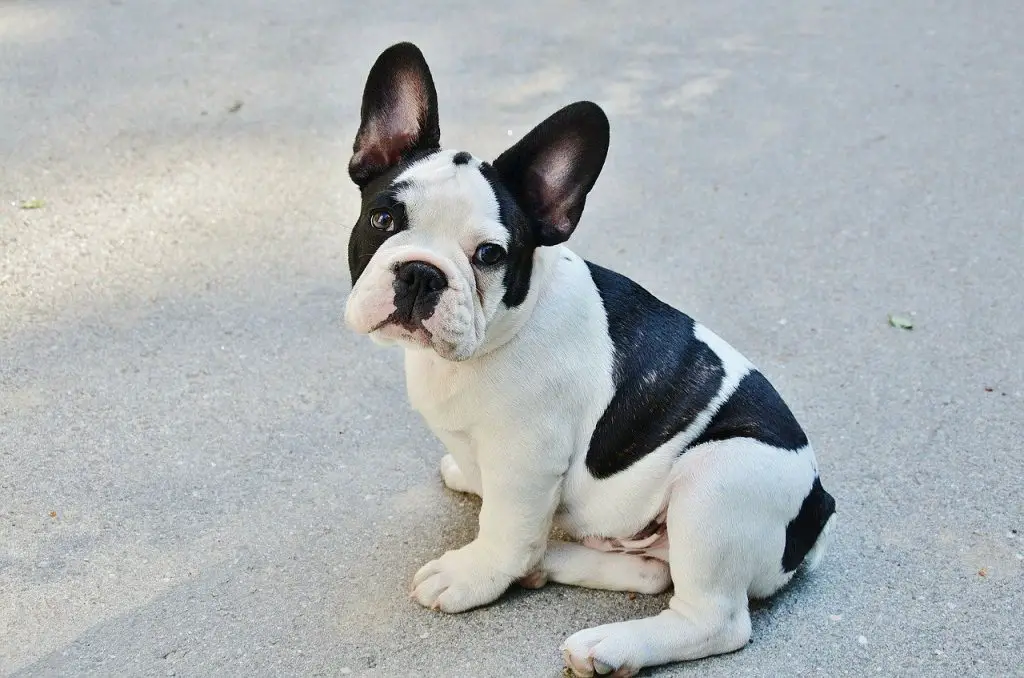Overview
Group: Non-Sporting Group
AKC Breed Popularity Rank: No. 4 of 195
Height: 11-13 inches
Weight: Under 28 lbs
Life Span: 10-12 years
Temperament: Intelligent; Highly Adaptable; Playful
The French Bulldog has been a huge favorite among city-dwelling dog lovers for its affectionate, playful, and lovable temperament. Described as a “clown-like dog”, it thrives in the company of humans and is very eager to please. This is one loving dog that definitely deserves a lot of love back!
History
The humble origins of the French Bulldog were in the mid-1800s in Nottingham, England. These toy-sized bulldogs served as mascots to lace makers, who eventually moved to France due to the decline in their business resulting from the Industrial Revolution.
While living in France, these toy bulldogs were crossed with Pugs and Terriers, producing the French Bulldog that we know today. Eventually, the dog reached Paris where they achieved the height of popularity among the artistes and fashionable ladies of the time.
In the 19th century, the French Bulldog also became popular in the U.S. and Europe, although there was some resistance at first from England. Since the Bulldog is considered the nation’s symbol, they disapproved of the French’s developing this new breed from Bulldog stock.
French Bulldogs were immortalized in paintings by Toulouse-Lautrec and Edgar Degas. One famous dog is Mutt, who served as a delivery dog and morale booster for soldiers during World War I. Proud French Bulldog owners include Yves Saint Laurent, D.H. Laurence, Lady Gaga, Leonardo DiCaprio, and Hugh Jackman..
General Appearance
Frenchies are sturdy, compact little dogs, muscular and heavy boned. Their short, smooth coats come in pied, fawn, and black brindle colors. Their heads are large and square, with wide-set dark eyes. The necks are thickset with loose skin at the base of the neck.
The Frenchie’s distinctive feature is its “bat ears”, erect ears with wide bases and rounded tips set high on the head.
In terms of temperament, Frenchies are generally well-behaved, adaptable, and fun-loving companions. They are alert and intelligent, making them ideal watchdogs. They are so affectionate that they are quite clingy, wanting to be close to their humans at all times. For dog lovers who prefer a little peace and quiet, Frenchies do not bark as often as other breeds, so that they are perfect for apartment or condo dwellers.
Nutrition
Frenchies thrive on high quality, well-balanced dog food that is appropriate to the stages of their growth. Like the Bulldog, Frenchies are prone to overweightedness and obesity, so weight and calorie intake should be carefully monitored. While training, do not overdo it with the treats. Avoid giving them high fat table scraps and cooked bones.
Grooming
Because of its soft, short, and smooth coat, Frenchies are minimal shedders. It is sufficient to brush them once a week with a soft-bristled brush or a grooming mitt. Make sure that you wipe their mouths clean. Because of their flat muzzles, they have the tendency to drool a lot. Give them a bath only when it is necessary. After a bath, make sure that you dry its facial folds thoroughly.
Exercise
Although it is an active little dog, they should not be kept outdoors for too long. Do not exercise Frenchies in hot weather since they easily get overheated and may result in heatstroke. In addition, because of their flat muzzle, they may experience breathing difficulties. If you want your dog to train in canine sports, like rally, obedience, and agility, you may want to consider indoor training facilities.
Training
Like other breeds, it is best to begin socialization and training classes when your Frenchies are still puppies. They can be quite willful at times, but they are not very responsive to harsher and stricter training methods. The key to training a well-mannered and well-adjusted Frenchie is through patience and consistency.
Health
Because of their flat muzzles, Frenchies are prone to breathing problems. They may also develop eye conditions, including juvenile cataracts, entropion (inward rolling of the eyelids), or cherry eye (protrusion of the third eyelid caused by weakening or detachment of anchoring tissues of an ocular gland. It appears as a cherry-red mass protruding from the eye.). They are also very sensitive to anesthesia. Frenchies may develop skin problems, such as allergies and autoimmune disorders.
Costs
A Frenchie is one of the most expensive dog breeds to own. The average price of a puppy is $2,300, but championship line dogs may cost $5,600 to $10,000. Health care costs on average is around $4,300, which would include vaccinations, spay/neuter, dog food, training classes, grooming, dog supplies, and annual check-ups, just to name a few. Because of the risk for certain medical conditions, it is necessary for your Frenchie to undergo cardiac and ophthalmologist evaluations yearly.
Despite the huge costs involved, lovers of French Bulldogs say that it is money well spent for a dog that is very loyal, devoted, and a cheerful companion to be with.
SOURCES:
1) French Bulldog https://www.akc.org/dog-breeds/french-bulldog/
2) 10 Things You Didn’t Know About French Bulldogs https://www.countrylife.co.uk/out-and-about/sporting-country-pursuits/10-things-you-didnt-know-about-french-bulldogs-153222
3) Entropion in Bulldogs and French Bulldogs Puppies https://vet4bulldog.com/zen-bulldog-maintenance/eye-problems-in-bulldogs/entropion-in-bulldogs-and-french-bulldogs-puppies/
4) How to Deal with French Bulldogs with Cherry Eye Issue? https://frenchie.world/blogs/news/how-to-deal-with-french-bulldog-cherry-eye-issue
5) Most Expensive Dog Breeds https://www.gobankingrates.com/saving-money/pets/most-expensive-dog-breeds/
6) French Bulldog Puppies for Sale https://www.nextdaypets.com/French-Bulldog.htm


